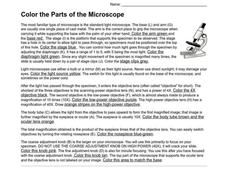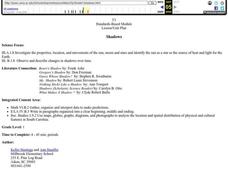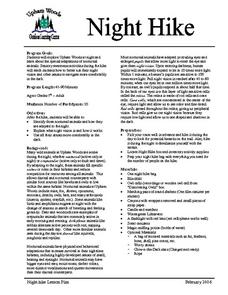Curated OER
Using Microscopes In The Classroom
Get up close and personal with parts of a microscope lesson plans and activities for elementary students!
Curated OER
Busting More Myths Using the Scientific Method
Use the Mythbusters model to jazz up your scientific method lessons!
Curated OER
Heat Absorption
Students examine how heat moves from substance to another. In this heat absorption activity students identify ways that heat is transferred and analyze data.
Curated OER
Growing Up (And Around, and Down...) Exploring Plant Growth
Students build plant growing structures. In this plant growth lesson, students plant growth structures such as a garden tepee or a crawl through tunnel. They grow plants that are appropriate for the structure.
Curated OER
Humor and Iconicity in Classical Music
Scherzo, cappricio, divertimento, and rando are all addressed in this look into humor through this classical music presentation. The slide show is very basic, but has some good background on Mozart, Haydn, Beethoven, and Bach. The...
Curated OER
Forms of Energy
Fifth graders brainstorm what forms of energy are used in an energy bike listing them on the board with the description placed beside each form for reference. They work in pairs to diagram the energy transformations that occurred while...
Curated OER
Reasons for Seasons
Students investigate a model of the tilt of the Earth in its relationship to the Sun during the different seasons of the year. They study the solstices and equinoxes, while determining how sunlight hits the Earth with different angles in...
Curated OER
Determining Red-Shift in a Receding Star
Students practice manipulating algebra formulas with more than one variable. They examine the topics of velocity, wavelength and frequency. They determine the amount of red-shift in a receding star.
Curated OER
Moon Phases, Day/Night
Fifth graders observe a demonstration that shows how the alignment of the sun, moon, earth relate to the phases of the moon that occur each month. They describe the moon's phases after experimenting in a small group setting and recording...
Curated OER
Microscopes
In this microscopes worksheet, 7th graders read information about microscopes and how they work. Students then complete several questions about the passage. Students study the diagram of a microscope using the letter definitions.
Curated OER
Fiber Optics
Students explore the uses of optical fibers, are exposed to the principles of refraction and total internal reflection, solve problems relating to the design of fiber optic cables, and compare them to copper transmission lines.
Curated OER
The Ozone Between Us
Students investigate how ground level ozone occurs in many areas of the country. They study the ozone problems that are associated with population centers.
Curated OER
Shadows
First graders measure how a shadow changes over the course of a day. They write about what they would do if they lost their shadow, and make silhouettes of themselves. Students make up a shadow dance and read stories about shadows.
Curated OER
Demonstration of Factors Affecting Soil Temperature
Young scholars examine the influences of water and mulch on soil temperature. In this investigative activity students complete a soil experiment.
Curated OER
Ohio Inventors
Fourth graders gain an understanding of the impacts that inventions have made on the lives of others and how new developments led to the growth of Ohio and the United States. They also investigate the lives of some individual inventors.
Curated OER
Lesson Plan # 1 - Phases of the Moon
Students explore and identify moon phases, watch teacher demonstration of different phases using globe and flashlight to represent moon and sun, and discuss reasons why there are moon phases.
Curated OER
Observations and Inferences
Young scholars observe how to distinguish observations form inferences. In this examining inferences lesson plan students list observations relating to the activity and discuss the importance of them.
Curated OER
Night Hike
Students explore Upham Woods at night and investigate about the special adaptations of nocturnal animals. They identify three nocturnal animals and how they are adapted to the night. Students explain what night vision is and how it works.
Curated OER
Student Power Use
Students calculate the energy usage in their bedroom. In this physics lesson, students compare their energy consumption during school days and weekends. They recommend ways to save energy.
Curated OER
Describing an Object's Position
Students explore language arts by participating in a shape identification activity. In this geometry shape lesson, students discuss the vocabulary terms used to describe the location of an object. Students complete a worksheet based upon...
Curated OER
Cool It! Comprehension: Chart 4
In these reading comprehension worksheets, learners read chart 4 about fixing global warming and then complete several activities that help them understand the things that can be done to reduce the amount of energy wasted.
Curated OER
Simple Circuits Lab
In this electrical circuit instructional activity, students follow a pre-planned lab activity to demonstrate a series and parallel circuit. They record their observations and answer 4 questions. This document is printable and the answers...
Curated OER
Stellar Fingerprints: the Spectra of Stars
Students explain how an element can be identified using emission spectra. They relate the emission spectrum of hydrogen to its absorption spectrum and identify hydrogen absorption lines in the spectrum of stars.
Curated OER
Handwashing and Sanitation
High schoolers apply Glo-Germ to their hands to see the amount of germs on their skin. As a class, they watch a demonstration on how to properly watch their hands to prevent the spread of disease. To end the lesson, they are introduced...
Other popular searches
- Light Sources
- Natural Light Sources
- Science and Light Sources
- Science Light Sources
- Childrens Light Sources
- Alternative Light Sources
- Man Made Light Sources
- Secondary Light Sources
- Chileans Light Sources
- Children's Light Sources
- Chilrens Light Sources
- Natural Sources of Light

























